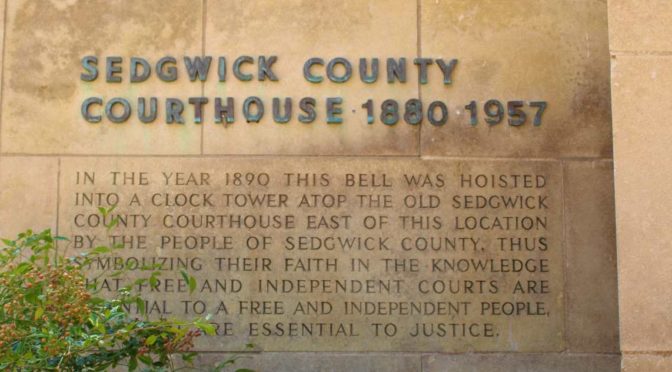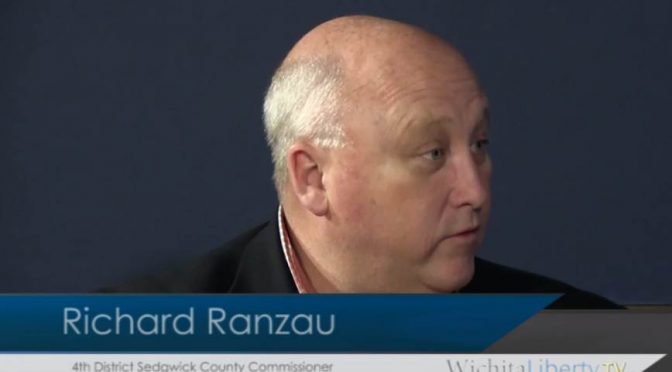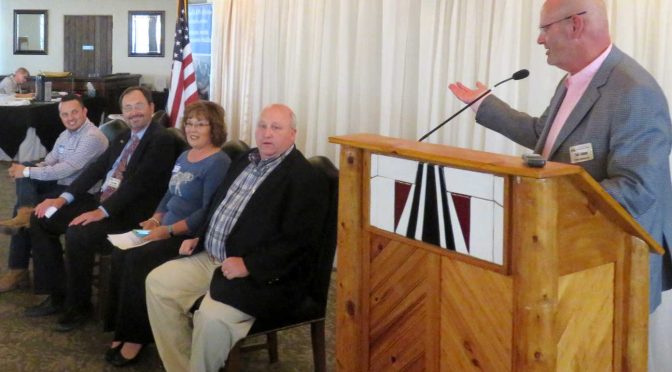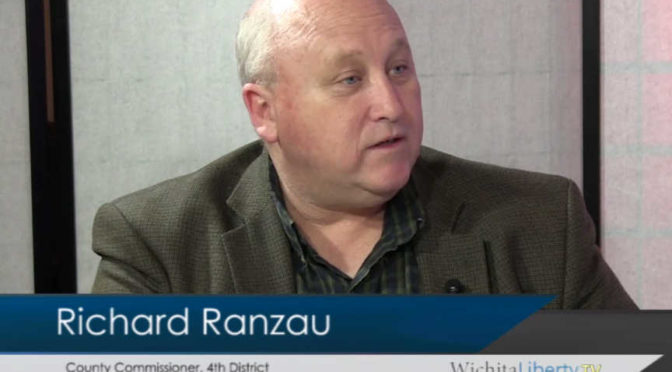Sedgwick County Commission candidate Hugh Nicks criticizes his opponent for living up to the values Nicks himself proclaims.
On July 13, 2018, Hugh Nicks wrote this on his campaign’s Facebook page, referring to Richard Ranzau: “And even questioned the need for handicapped-accessible recreational options.” 1
Nicks is a candidate for the Board of Sedgwick County Commissioners, District 4. His opponent is the incumbent Richard Ranzau.
The accusation is a bit vague, but it’s pretty certain that Nicks is referring to an item from 2011 when commissioners were asked to approve spending $53,500 on what was described as “VIC’S LAKE FISHING DOCK – FACILITIES DEPARTMENT FUNDING — ADA COMPLIANCE UPGRADES.”
Examining the record, we find that yes, there is a grain of truth in Nicks’ allegation: Ranzau did question this item, but not because it was “handicapped-accessible.” Here’s what happened.
On September 28, 2011, when this item came before the commissioners, Commissioner Ranzau expressed concern with the cost of the fishing dock, given the information commissioners had been provided. So too did Commissioners Karl Peterjohn and Tim Norton. A motion was made to defer the item, and all commissioners present that day voted in agreement. 2
At the next meeting, on October 5, 2011, the item was again on the agenda. 3 At this meeting Joe Thomas, at that time Acting Director of the Purchasing Department, explained that the dock itself did not cost $53,500. Instead, the dock cost only $26,162. Other necessary items in the project included site prep ($6,920), a concrete sidewalk ($3,066), a concrete pavement parking and picnic area which includes an ADA (Americans with Disabilities Act) compliant picnic table ($6,852), an asphalt drive ($7,400), site restoration ($1,500), and “general conditions” ($1,600).
Knowing this, $53,500 seems reasonable. And Ranzau said as much in remarks after these costs were presented: “So my questions were not based on whether or not because it was an ADA dock. If you take the word ADA off of it and you come to me and say you’re going to build a $53,000 dock, I’m going to ask, do we really need to do that? Because that’s a lot of money for a dock, and so we asked for further information about how that money was going to be spent, and it clarifies a lot of information.”
After more discussion, there was a vote, and all commissioners voted in favor of building the dock, including Ranzau and Peterjohn.
Now that we know the whole story, why would Hugh Nicks be critical of Ranzau on this matter? Especially considering these values listed in bullet points on Nicks’ campaign literature:
- Never be afraid of hard work.
- Listen openly. Debate respectfully. Ask tough questions.
- Be conservative with finances and generous with time.
- Decisions have consequences. Make them wisely.
I’ve emphasized where Ranzau’s action on the fishing dock aligns with Nicks’ values. The questions Ranzau asked weren’t really “tough questions,” but they were needed and submitted respectfully. The answers helped the commissioners learn they were indeed being conservative with finances. It was a decision made wisely, with complete information.
So exactly what problems does Hugh Nicks have with Richard Ranzau?
—
Following, relevant Sedgwick County Commission meeting minutes.
Excerpt from the meeting of the Sedgwick County Board of Commissioners on September 28, 2011:
Chairman Unruh said, “Now we’re ready to discuss Item 6, and Commissioner Ranzau, I will ask you to lead that discussion, also.”
Commissioner Ranzau said, “Well, this is $50,000 for a boat dock, or for a dock out at the fishing lake. While I’ve had time to go out and look at the bridge at the Boys Ranch, I’ve not looked at this specific thing. And with the information I’ve been given, I’m not prepared to support this, because I’m not sure this is the best route to go. Particularly at this current status with our finances here, this seems like a lot of money for a fishing dock. And even though I’m a fisherman, I’m just not convinced. Unless I’m totally convinced it’s appropriate enough of a project, I’m not prepared to vote yes. It’s really up to the will of the Board. Today, if we vote on it today, I’ll vote no.” Chairman Unruh said, “Thank you. Commissioner Peterjohn.”
Commissioner Peterjohn said, “Thank you, Mr. Chairman. I’m concerned with the price tag of $53,500 for basically a boat dock. I have concerns on the expense here, and I realize this is the low bid, and it’s a low bid by significant margin from two other firms that provided bids, and there was a much larger list of firms that didn’t even offer. My question to ask, is if we could also put this issue off a week like we did Item number 4 without causing any difficulty?”
Mr. William P. Buchanan said, “Yes.”
Commissioner Peterjohn said, “Mr. Chairman, I’d like to see if we could get some more information on this project, just like we did on the prior item.”
MOTION
Commissioner Peterjohn moved to defer Item 6 of the Board of Bids and Contracts Regular Meeting of September 22, 2011.
Commissioner Ranzau seconded the motion.
Chairman Unruh said, “All right. We have a motion and a second. Discussion? Commissioner Norton.”
Commissioner Norton said, “I’ll support the deferral. I would like to ask a question, though. It talks about that it’s not just the boat dock that we’re, actually we’re replacing one that should be out of service. Is that correct?”
There followed more discussion, and then the vote on the deferral. All commissioners voted in favor, except for Commissioner Skelton, who was absent.
Here are the complete minutes for the dock item from the meeting of the Sedgwick County Board of Commissioners on October 5, 2011:
L 11-1028 RECONSIDERATION OF ITEM 6 OF THE MINUTES OF THE SEPTEMBER 22, 2011 MEETING OF THE BOARD OF BIDS AND CONTRACTS: VIC’S LAKE FISHING DOCK- FACILITIES DEPARTMENT.
Presented by Joe Thomas, Director, Purchasing Department. This item was deferred at the September 28, 2011 Commission Meeting.
RECOMMENDED ACTION: Approve the recommendations of the Board of Bids and Contracts.
Mr. Joe Thomas, Acting Director, Purchasing Department, greeted the Commissioners and said, “The recommendation for this item is to accept the low bid from DanCo Enterprises, Inc in the amount of $53,500.00. I’ll be happy to answer questions. We also have members of staff that are available to answer questions as well, and I recommend approval of this item.”
Chairman Unruh said, “All right. Thank you, Joe. We’ve had lots of discussion and exposure to this item. Commissioners, are there any other comment or questions that need to be answered?”
MOTION
Commissioner Norton moved to approve the recommendation from the Board of Bids and Contracts. Commissioner Skelton seconded the motion.Chairman Unruh said, “Thank you. We have a motion and a second. Commissioner Peterjohn.”
Commissioner Peterjohn said, “Thank you, Mr. Chairman. Joe, could you give us just a quick rundown in terms of the, because the heartburn that we expressed last week was we were looking at a dock that was $53,000, and then we discussed $53,000 and change, and we discovered it was more than just a dock. And I was very much interested in getting for the record and appreciating of staff and other folks in terms of getting the bid broken down so we had a better understanding of what the numbers
actually were.”Mr. Thomas said, “Yes. The fishing dock itself was $26,162, site prep was $6,920. Then there is a concrete sidewalk in the amount of $3,066. Then there is a concrete pavement parking and picnic area which includes ADA (Americans with Disabilities Act) compliant picnic table, $6,852. The asphalt drive was $7,400. To restore the site was $1,500, and general conditions $1,600 that made that total of $53,500.”
Commissioner Peterjohn said, “Thank you, Joe. Because Sedgwick County Park is, at the moment, currently surrounded by my district even though my best efforts to try to and get it split it up between myself and Commissioner Ranzau was not successful. But it’s a jewel, I think, that’s valuable for the entire Commission and the entire community, so I’m planning to be supportive now that we have this additional information and details. It’s a lot easier to explain the costs. It’s still an awful lot of money, but I’m comfortable with it, and I’ll be supportive.”
Chairman Unruh said, “Thank you, Commissioner. Commissioner Ranzau.”
Commissioner Ranzau said, “Thank you, Mr. Chairman. I want to make several comments here. I originally wanted to postpone this or had some issues with this for a couple of reasons. I asked the question, do we really need to do, have an ADA dock given our current situation, our financial situation, and why do we need to do this now and I also questioned the cost of it. I’ve gotten some feedback, some of it supportive of my position, some of it is not. Some people think my opposition is somehow because I oppose the ADA or people with disabilities, which could not be further from the truth. I think it’s important to remember that we have an ADA plan here at the county which I have supported voted for things previously and I will continue to do so. So my questions were not based on whether or not because it was an ADA dock. If you take the word ADA off of it and you come to me and say you’re going to build a $53,000 dock, I’m going to ask, do we really need to do that? Because that’s a lot of money for a dock, and so we asked for further information about how that money was going to be spent, and it clarifies a lot of information. I think it’s reasonable and justified to question how we spend taxpayer dollars regardless of what it’s going to be spent on.
“I think the fact that it has an ADA stamp on it doesn’t mean in my mind that it should get a pass. I have questioned things that the Sheriff Department is going to do. I’ve questioned things that the Fire Department is going to do. I’ve questioned things that the road and bridge, Public Works are going to do. It’s not because I don’t support those things, but I want to make sure that each project and each cost is appropriate. I will continue to support the ADA program, but once again, if there is a program in the future that I think the costs seems a little out of whack, I’m not going to hesitate on behalf of the citizens to ask for more information and put the vote off if necessary. I also want to point out that at this particular meeting, we actually postponed two items.
Commissioner Ranzau continued, ““It was this item, and another one was a bridge that we’re going to possibly put in down at the [Judge Riddle] Boys Ranch. I called it a bridge to nowhere, because it’s actually a bridge to get horses to the pasture. And in my mind, that was the most problematic of the two, to be honest, because it’s almost four times the cost almost as what this is. That’s the one I spent more time investigating and learning about and as you’ll notice, it’s not back on the agenda yet, so we’ll have to address that in the future. I’m not singling out the ADA program at all. I have voted for them in the past and will continue to do so, but I’ll take a close eye at every spending project we have. And like I said, there were two different items on last week’s agenda that I talked about, and the most clearly problematic was the other one, the other one that didn’t get all the attention or all the press. So I want to clarify that so that people understand where I’m coming from. As I said, I make no apologies for examining how we are spending taxpayer dollars regardless of where it comes from, if it’s ADA, police, sheriff, whatever, these are all good programs, but we just need to make sure we get the best bang for our buck. Thank you.”
Chairman Unruh said, “Thank you, Commissioner. Before we go to vote here, Mr. David Calvert is here, a leader in the community for ADA issues. Did you want to make a comment, sir?”
Mr. David Calvert, Chair, Wichita/Sedgwick County Access Advisory Board, greeted the Commissioners and said, “I would like to, Mr. Chairman, just briefly, and I’ll spare you the 30-minute…I’ve got a microphone on. I don’t know if it works. I can hear myself, but that’s about it. I am David Calvert. I’m an attorney, but I also chair and have chaired for the last six years the Wichita/Sedgwick County Access Advisory Board, started out as the Wichita Access Advisory Board to advise the city on disability issues. Sedgwick County joined this board by this board’s request in, I think 2007, and each of you Commissioners have appointees to that board and the Manager has appointees to that board as well. I will spare you the history of the Americans with Disabilities Act (ADA). I will say as part of the proactive stance this county has taken and this board has taken on compliance with the Americans with Disabilities Act, a self-evaluation and transition plan was created in 2006. Self-evaluation itself is online. It is 200 pages. I don’t necessarily urge you to read it. I will tell you that the transition plan is also online, and there is a link to those plans on the home page, again to the county’s credit.
“The list of facilities covered by the transition plan is itself six pages long. The link to the Sedgwick County Park gets you to the Sedgwick County Park’s transition plan, which is 17 pages long. The total of all of these is like a couple of thousand pages. This particular fishing dock is referenced in the transition plan, pointing out that there are no accessible docks at all in Sedgwick County Park, and each one of the projects set forth in the transition plan is given a priority rating from very high to low priority. Low priority items can be done 5 or 10 years from now, high priority and very high priority items, many which should have been done by now. This is a very high priority item, and simply gives access to people with disabilities, which covers statistically probably 75,000 people in Sedgwick County alone, and if we all live long enough, it will cover each and every one of us at one time in our lives.
“The reason everybody doesn’t end up with a disability is a lot of us simply die first, which I guess is the ultimate disability, isn’t it? But I would, this is part of this Commission’s continuing commitment to ADA compliance. People with disabilities don’t ask for special favors.
“We ask for compliance with the ADA, which simply gives people with disabilities the same right to be independent that people without disabilities have, and I think that that’s what this does. I would urge this Commission to unanimously support this bid. Thank you.”
Chairman Unruh said, “Thank you, sir. We have a couple more comments. Commissioner Ranzau.”
Commissioner Ranzau said, “Thank you, Mr. Chairman. I want to clarify a couple of things just for the public. The $53,000 we’re spending, $26,000 is for the dock itself. Now, that’s been part of my consternation that regardless whether it’s ADA compliant or not that that seems like a lot of money, but I know Mark Sroufe has done some research, and it’s possible that that actual cost will come in less than that, because he’s compared it to the price of some docks that other facilities have put into place. Also one of the big questions was why are we doing a dock now compared to, well, when you put it in the context of the overall budget. And I’ve been told that it’s a matter of priority and timing in that for the parks system, this is the high priority because, as he stated, we have no accessible docks, and it’s also a factor of timing in that the dock is getting to the point that now it needs to be replaced. So, I have to put all of those things together and then decide if this is the best way to spend money on behalf of the citizens at this time, and that’s why we took the time to ask the questions to get more information.”
Chairman Unruh said, “Thank you, Commissioner. Commissioner Skelton.”
Commissioner Skelton said, “I just wanted to concur with Mr. Calvert’s comments. I appreciate them very much. That provides the basis for my support for this project today.”
Chairman Unruh said, “Thank you, Commissioner. Commissioner Peterjohn.”
Commissioner Peterjohn said, “I’ll just state for the record I appreciate Mr. Calvert’s work on a volunteer basis for the board that works with these issues here in Sedgwick County. Thank you, Mr. Chairman.”
Chairman Unruh said, “Thank you. Commissioner Norton.”
Commissioner Norton said, “Well, I’m going to be supportive. I’ve been supportive of what we’ve done over the years for our population that have difficulties maneuvering our community. The truth is to me it’s not about ADA, although some of that is prescriptive, it’s about what’s right for our community and the population that we live with that are part of our families, a robust part of our community and doing the right thing. So it’s not about the ADA, it’s prescriptive on what we do when we remodel something. It’s about what is right for our community. We’ve developed Sedgwick County Park with a balanced playground through help from West Side Rotary [Club of Wichita]. We continue to try to make our community as vibrant as we can for all the populations. So I think it’s the right thing to do. We were going to replace that anyway, and it makes sense to replace it in a manner that will make it accessible to all citizens regardless of age and difficulty. That’s all I have, Mr. Chair.”
Chairman Unruh said, “Thank you, Commissioner. I don’t believe I can add anything to all the conversation.
Chairman Unruh continued, “I also express my appreciation to Mr. Calvert and for your leadership on our committee that addresses these issues and I also see Lindsey here, she’s our staff person who keeps us on track. We’re proud of the valuable work she does for us all, so thank you.”
Mr. Calvert said, “I want to say, Mr. Chairman, if I might, Lindsey is the Vice Chairman of our committee, and she’s the one that does all the work.”
Chairman Unruh said, “It’s good to have someone like that around, isn’t it? Mr. Manager.”
Mr. Buchanan said, “I can’t help myself. So does that mean you’re the pretty face?”
Mr. Calvert said, “Are you looking at me or are you looking…”
Mr. Buchanan said, “Yes, no, I’m looking at you, Dave.”
Commissioner Peterjohn said, “I think the Manager needs a new pair of glasses.”
Chairman Unruh said, “You were right, Mr. Manager, that was unnecessary. Madam Clerk, I think we have a motion, we’re ready to call the vote.”
There was a vote, and all commissioners voted in favor.
—
Notes
- Nicks For County Commission Facebook page, July 13, 2018. Available at https://www.facebook.com/NicksForCountyCommission/photos/a.1633354576739927.1073741832.1591968844211834/2000527696689278/. ↩
- Board of Sedgwick County Commissioners. Meeting detail, September 28, 2011. Available at https://sedgwickcounty.legistar.com/MeetingDetail.aspx?ID=161070&GUID=2982541F-CC0E-4FFE-9DE3-CE1C4D59FA4D. ↩
- Board of Sedgwick County Commissioners. Meeting detail, October 5, 2011. Available at https://sedgwickcounty.legistar.com/MeetingDetail.aspx?ID=162540&GUID=1CF92BD6-DF16-460A-8BFA-F1B86A5AB115. ↩





 From the Wichita Pachyderm Club: Sedgwick County Commission candidates Richard Ranzau and Hugh Nicks. These are Republicans vying for the District 4 nomination. Recorded June 8, 2018.
From the Wichita Pachyderm Club: Sedgwick County Commission candidates Richard Ranzau and Hugh Nicks. These are Republicans vying for the District 4 nomination. Recorded June 8, 2018.



